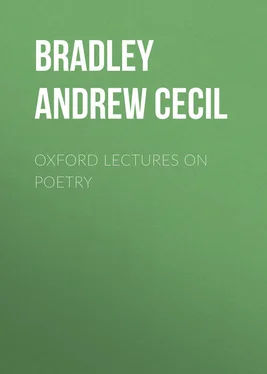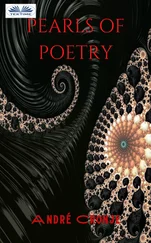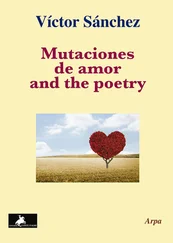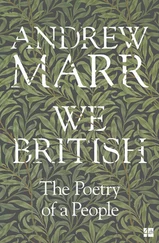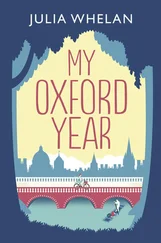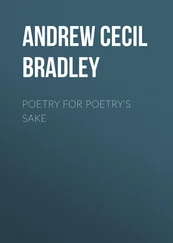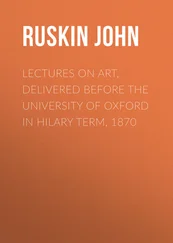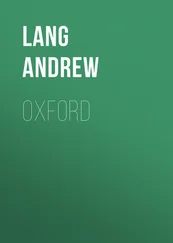Andrew Bradley - Oxford Lectures on Poetry
Здесь есть возможность читать онлайн «Andrew Bradley - Oxford Lectures on Poetry» — ознакомительный отрывок электронной книги совершенно бесплатно, а после прочтения отрывка купить полную версию. В некоторых случаях можно слушать аудио, скачать через торрент в формате fb2 и присутствует краткое содержание. ISBN: , Жанр: foreign_antique, foreign_prose, foreign_poetry, на английском языке. Описание произведения, (предисловие) а так же отзывы посетителей доступны на портале библиотеки ЛибКат.
- Название:Oxford Lectures on Poetry
- Автор:
- Жанр:
- Год:неизвестен
- ISBN:http://www.gutenberg.org/ebooks/36773
- Рейтинг книги:4 / 5. Голосов: 1
-
Избранное:Добавить в избранное
- Отзывы:
-
Ваша оценка:
- 80
- 1
- 2
- 3
- 4
- 5
Oxford Lectures on Poetry: краткое содержание, описание и аннотация
Предлагаем к чтению аннотацию, описание, краткое содержание или предисловие (зависит от того, что написал сам автор книги «Oxford Lectures on Poetry»). Если вы не нашли необходимую информацию о книге — напишите в комментариях, мы постараемся отыскать её.
Oxford Lectures on Poetry — читать онлайн ознакомительный отрывок
Ниже представлен текст книги, разбитый по страницам. Система сохранения места последней прочитанной страницы, позволяет с удобством читать онлайн бесплатно книгу «Oxford Lectures on Poetry», без необходимости каждый раз заново искать на чём Вы остановились. Поставьте закладку, и сможете в любой момент перейти на страницу, на которой закончили чтение.
Интервал:
Закладка:
Hence it is clear that, if by ‘versification taken by itself’ one means the versification of a poem , it is impossible under the requisite conditions to get at this versification by itself. The versification of a poem is always, to speak loosely, influenced by the sense. The bare metrical scheme, to go no further, is practically never followed by the poet. Suppose yourself to know no English, and to perceive merely that in its general scheme
It gives a very echo to the seat
is an iambic line of five feet; and then read the line as you would have to read it; and then ask if that noise is the sound of the line in the poem .
In the text, therefore, more is admitted than in strictness should be admitted. For I have assumed for the moment that you can hear the sound of poetry if you read poetry which you do not in the least understand, whereas in fact that sound cannot be produced at all except by a person who knows something of the meaning.
This paragraph has not, to my knowledge, been adversely criticised, but it now appears to me seriously misleading. It refers to certain kinds of poetry, and again to certain passages in poems, which we feel to be less poetical than some other kinds or passages. But this difference of degree in poeticalness (if I may use the word) is put as a difference between ‘mixed’ and ‘pure’ poetry; and that distinction is, I think, unreal and mischievous. Further, it is implied that in less poetical poetry there necessarily is only a partial unity of content and form. This (unless I am now mistaken) is a mistake, and a mistake due to failure to hold fast the main idea of the lecture. Naturally it would be most agreeable to me to re-write the paragraph, but if I reprint it and expose my errors the reader will perhaps be helped to a firmer grasp of that idea.
It is true that where poetry is most poetic we feel most decidedly how impossible it is to separate content and form. But where poetry is less poetic and does not make us feel this unity so decidedly, it does not follow that the unity is imperfect. Failure or partial failure in this unity is always (as in the case of Shakespeare referred to) a failure on the part of the poet (though it is not always due to the same causes). It does not lie of necessity in the nature of a particular kind of poetry ( e. g. satire) or in the nature of a particular passage. All poetry cannot be equally poetic, but all poetry ought to maintain the unity of content and form, and, in that sense, to be ‘pure.’ Only in certain kinds, and in certain passages, it is more difficult for the poet to maintain it than in others.
Let us take first the ‘passages’ and suppose them to occur in one of the more poetic kinds of poetry. In certain parts of any epic or tragedy matter has to be treated which, though necessary to the whole, is not in itself favourable to poetry, or would not in itself be a good ‘subject.’ But it is the business of the poet to do his best to make this matter poetry, and pure poetry. And, if he succeeds, the passage, though it will probably be less poetic than the bulk of the poem, will exhibit the complete unity of content and form. It will not strike us as a mere bridge between other passages; it will be enjoyable for itself; and it will not occur to us to think that the poet was dealing with an un-poetic ‘matter’ and found his task difficult or irksome. Shakespeare frequently does not trouble himself to face this problem and leaves an imperfect unity. The conscientious artists, like Virgil, Milton, Tennyson, habitually face, it and frequently solve it. 13 13 In Schiller’s phrase, they have extirpated the mere ‘matter.’ We often say that they do this by dint of style. This is roughly true, but in strictness it means, as we have seen, not that they decorate the mere ‘matter’ with a mere ‘form,’ but that they produce a new content-form.
And when they wholly or partially fail, the fault is still theirs . It is, in one sense, due to the ‘matter,’ which set a hard problem; but they would be the first to declare that nothing in the poem ought to be only mixedly poetic.
In the same way, satire is not in its nature a highly poetic kind of poetry, but it ought, in its own kind, to be poetry throughout, and therefore ought not to show a merely partial unity of content and form. If the satirist makes us exclaim ‘This is sheer prose wonderfully well disguised,’ that is a fault, and his fault (unless it happens to be ours). The idea that a tragedy or lyric could really be reproduced in a form not its own strikes us as ridiculous; the idea that a satire could so be reproduced seems much less ridiculous; but if it were true the satire would not be poetry at all.
The reader will now see where, in my judgment, the paragraph is wrong. Elsewhere it is, I think, right, though it deals with a subject far too large for a paragraph. This is also true of the next paragraph, which uses the false distinction of ‘pure’ and ‘mixed,’ and which will hold in various degrees of poetry in various degrees poetical.
It is of course possible to use a distinction of ‘pure’ and ‘mixed’ in another sense. Poetry, whatever its kind, would be pure as far as it preserved the unity of content and form; mixed, so far as it failed to do so – in other words, failed to be poetry and was partly prosaic.
It is possible therefore that the poem, as it existed at certain stages in its growth, may correspond roughly with the poem as it exists in the memories of various readers. A reader who is fond of the poem and often thinks of it, but remembers only half the words and perhaps fills up the gaps with his own words, may possess something like the poem as it was when half-made. There are readers again who retain only what they would call the ‘idea’ of the poem; and the poem may have begun from such an idea. Others will forget all the words, and will not profess to remember even the ‘meaning,’ but believe that they possess the ‘spirit’ of the poem. And what they possess may have, I think, an immense value. The poem, of course, it is not; but it may answer to the state of imaginative feeling or emotional imagination which was the germ of the poem. This is, in one sense, quite definite: it would not be the germ of a decidedly different poem: but in another sense it is indefinite, comparatively structureless, more a ‘stimmung’ than an idea.
Such correspondences, naturally, must be very rough, if only because the readers have been at one time in contact with the fully grown poem.
I should be sorry if what is said here and elsewhere were taken to imply depreciation of all attempts at the interpretation of works of art. As regards poetry, such attempts, though they cannot possibly express the whole meaning of a poem, may do much to facilitate the poetic apprehension of that meaning. And, although the attempt is still more hazardous in the case of music and painting, I believe it may have a similar value. That its results may be absurd or disgusting goes without saying, and whether they are ever of use to musicians or the musically educated I do not know. But I see no reason why an exceedingly competent person should not try to indicate the emotional tone of a composition, movement, or passage, or the changes of feeling within it, or even, very roughly, the ‘idea’ he may suppose it to embody (though he need not imply that the composer had any of this before his mind). And I believe that such indications, however inadequate they must be, may greatly help the uneducated lover of music to hear more truly the music itself.
This new question has ‘quite another sense’ than that of the question, What is the meaning or content expressed by the form of a poem? The new question asks, What is it that the poem , the unity of this content and form, is trying to express? This ‘beyond’ is beyond the content as well as the form.
Читать дальшеИнтервал:
Закладка:
Похожие книги на «Oxford Lectures on Poetry»
Представляем Вашему вниманию похожие книги на «Oxford Lectures on Poetry» списком для выбора. Мы отобрали схожую по названию и смыслу литературу в надежде предоставить читателям больше вариантов отыскать новые, интересные, ещё непрочитанные произведения.
Обсуждение, отзывы о книге «Oxford Lectures on Poetry» и просто собственные мнения читателей. Оставьте ваши комментарии, напишите, что Вы думаете о произведении, его смысле или главных героях. Укажите что конкретно понравилось, а что нет, и почему Вы так считаете.
